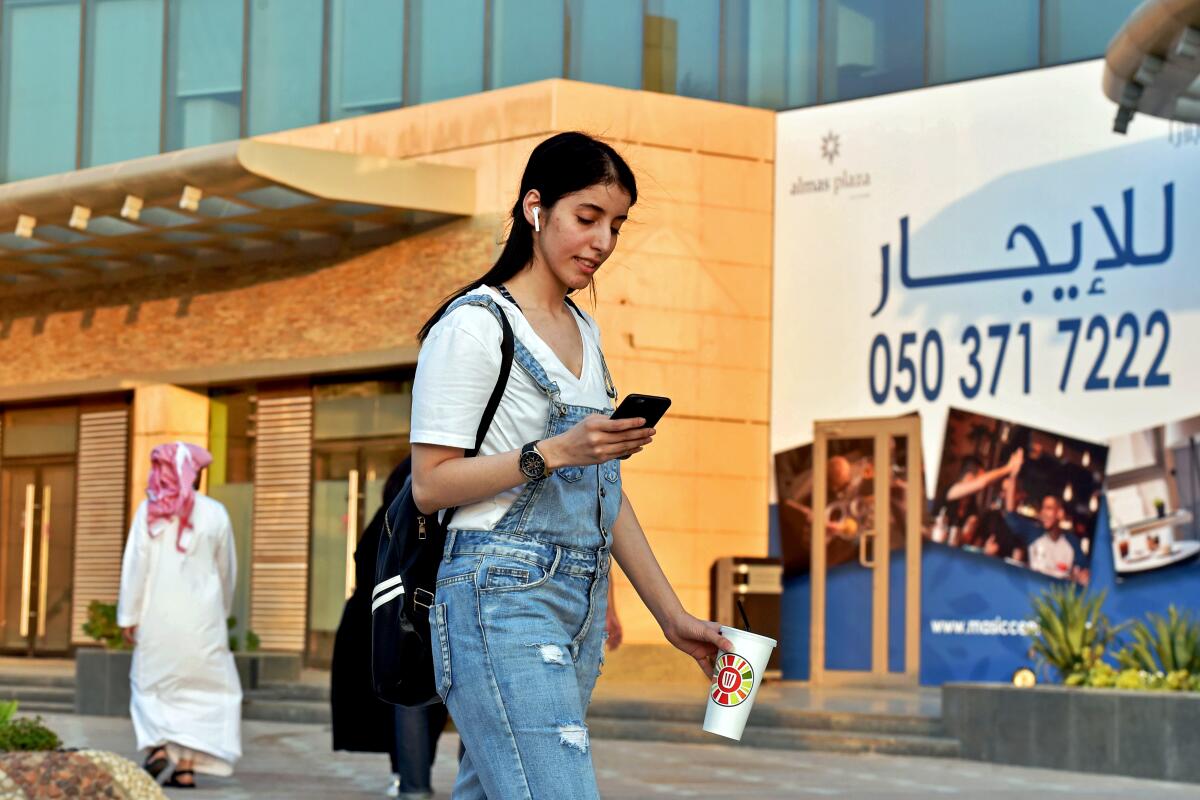Saudi women, bucking tradition, forgo abaya

- Share via
BAGHDAD — One May morning in Riyadh, Manahel Otaibi, a 25-year-old Saudi woman who had just moved back to Saudi Arabia after finishing her studies in China, was getting dressed to go to the gym.
She put on a pair of jeans and a T-shirt, grabbed her bag and headed out. Her abaya, the all-black shroud that is the customary attire for women in Saudi Arabia, stayed home.
That might appear to have been a trivial matter, but for Otaibi, who for years had seethed at the custom of wearing the abaya over her clothes, it was nothing less than a personal victory.
“I know people might mock this feeling, but when you have a uniform imposed on you for years and then you free yourself … how would you feel?” she said in a recent interview. “It was like I regained a right, that you were shackled by something you didn’t believe in and now really started living life.”
Saudi Arabia has all but dismantled its guardianship system, the combination of laws and societal traditions that treated women as second-class citizens and sought to keep them — both legally and literally — out of sight.
But while the more onerous elements of guardianship — such as a need for male permission to apply for a passport or undertake medical procedures — have been overturned, there are still no official regulations specifying women’s dress.
On paper, there are no laws criminalizing women who do not wear the abaya. In practice, though, very few leave home without it for fear of harassment.
Those who choose to do so often invoke Mohammed bin Salman, the kingdom’s crown prince and de facto ruler, who in the last year has railroaded through laws granting women new freedoms, including the removal of a driving ban, while cracking down on anyone raising objections.
In a 2018 interview with CBS, Mohammed said that both men and women had to dress modestly, but that Islam does not stipulate having to wear the abaya or don a head covering.
Nevertheless, many seem perturbed by the sight of uncovered women and a large majority continue to wear the abaya.
“I would hear people making comments, giving me a look like I was naked, or they would speak to me in English because they thought I was a foreigner,” said Otaibi, adding that some of her friends were initially afraid for her safety when they would go out with her.
With no formal regulations in place, an establishment can refuse entry to uncovered women in the name of an unclear standard of ihtisham, or modesty. That’s what happened to Mashael Jaloud, 33, a human resources specialist, when she tried to walk into the Riyadh Park Mall in July.
By that point, Jaloud had spent months gradually substituting her abaya with a coat before fully abandoning it, and had frequented restaurants and cafes with little incident.
But when she approached the mall’s gates in pants and a long-sleeve shirt, she was told she wasn’t dressed appropriately and couldn’t enter. She insisted, showing them the crown prince’s CBS interview. They didn’t care; the police were called.
Jaloud later posted a tweet to the mall’s management saying her dress was modest, along with a video; the latter garnered more than 900,000 views and sparked a deluge of commentary, much of it negative. More than a month later she was still getting comments, with some even accusing her of betraying the country.
Even members of the royal family joined in attacking her: Prince Sattam Saud accused Jaloud of being a “fame seeker” and said that her not wearing the abaya to the mall “was a provocative act that is unacceptable to everyone.”
Jaloud hasn’t returned to the mall since. Riyadh Park’s management responded to request for a comment by saying it adhered to standards on modesty set by the authorities.
Otaibi, too, had employees in various establishments try to stop her from entering, “not because there was anything illegal,” she said, “but because of people’s views on the matter.”
Both Jaloud and Otaibi still wear the abaya to work, and although few women have joined them in going abaya-less, Jaloud believes it’s a matter of the government removing the ambiguity and the room for what she described as “personal interpretations.”
“If regulations are issued on this matter, it will make things easier,” she said.
Nevertheless, neither had plans to go back to wearing the abaya.
“All I know is that I managed to show the truth, that there is no law criminalizing wearing something as long as it’s modest dress,” said Otaibi.
“In the end I’m not doing anything wrong.”
More to Read
Sign up for Essential California
The most important California stories and recommendations in your inbox every morning.
You may occasionally receive promotional content from the Los Angeles Times.












